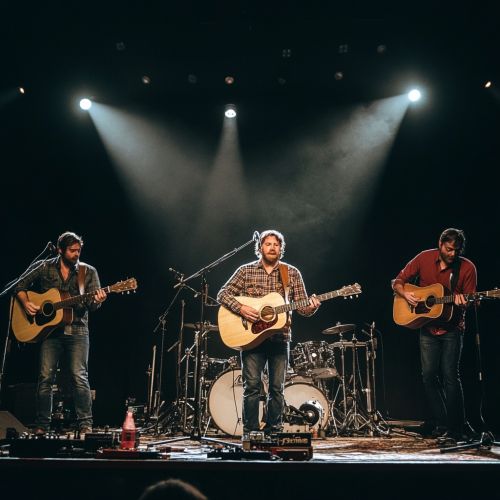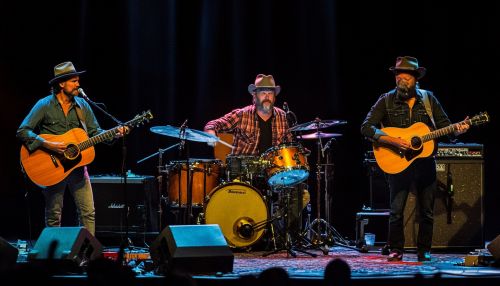Americana (music)
Introduction
Americana music is a genre that encompasses a wide range of American musical styles, including elements of folk, country, blues, rock, and bluegrass. It is characterized by its roots-oriented sound and its emphasis on storytelling and traditional themes. Americana music often draws on the rich tapestry of American cultural and musical history, blending various influences to create a sound that is both familiar and innovative.
Historical Context
Origins
The origins of Americana music can be traced back to the early 20th century, when American musicians began to blend elements of traditional folk music with other popular styles. The Great Depression and the Dust Bowl era were significant periods that influenced the development of Americana, as musicians sought to capture the struggles and resilience of the American people through their music. The genre continued to evolve throughout the 20th century, incorporating influences from various regions and cultures.
Evolution
In the 1960s and 1970s, the folk revival movement played a crucial role in the development of Americana music. Artists like Bob Dylan and The Band began to experiment with blending folk, rock, and country elements, paving the way for the modern Americana sound. The genre gained further prominence in the 1980s and 1990s with the rise of artists like Emmylou Harris, Lucinda Williams, and Steve Earle, who brought a new level of sophistication and artistry to the genre.
Musical Characteristics
Instrumentation
Americana music typically features a diverse array of instruments, including acoustic and electric guitars, banjos, fiddles, mandolins, harmonicas, and pedal steel guitars. The use of traditional instruments is a hallmark of the genre, contributing to its roots-oriented sound. The instrumentation often varies depending on the specific subgenre or regional influence within Americana.
Vocal Styles
Vocal styles in Americana music are diverse, ranging from the raw, emotive delivery of blues singers to the smooth, melodic harmonies of country and folk artists. Storytelling is a central component of Americana lyrics, with songs often exploring themes of love, loss, hardship, and redemption. The vocal delivery is typically characterized by its authenticity and emotional depth.
Song Structure
Americana songs often follow traditional song structures, such as verse-chorus or AABA forms. However, the genre is known for its flexibility and willingness to experiment with unconventional arrangements. This openness to innovation allows Americana artists to push the boundaries of traditional music while still maintaining a connection to its roots.
Influences and Subgenres
Folk and Country
Folk and country music are foundational influences on Americana, providing the genre with its storytelling tradition and acoustic instrumentation. The narrative-driven lyrics and simple, yet evocative melodies of folk and country music have been integral to the development of Americana.
Blues and Rock
The influence of blues and rock music is evident in the rhythmic drive and emotional intensity of Americana. The blues' emphasis on personal expression and the raw energy of rock music have contributed to the genre's dynamic sound. Many Americana artists incorporate elements of electric blues and roots rock into their music.
Bluegrass and Gospel
Bluegrass and gospel music have also played a significant role in shaping Americana. The virtuosic instrumentation and tight harmonies of bluegrass, along with the spiritual themes and vocal arrangements of gospel, have enriched the genre's musical palette. These influences are often reflected in the intricate instrumental work and vocal harmonies found in Americana music.
Notable Artists and Albums
Pioneers
Several artists have been instrumental in defining and popularizing Americana music. Johnny Cash, with his distinctive blend of country, rock, and folk, is often regarded as a pioneer of the genre. His storytelling prowess and deep, resonant voice have left a lasting impact on Americana music.


Contemporary Artists
In recent years, a new generation of Americana artists has emerged, bringing fresh perspectives and innovative sounds to the genre. Artists like Jason Isbell, Brandi Carlile, and Sturgill Simpson have garnered critical acclaim for their contributions to Americana music. Their work often explores contemporary themes while maintaining a strong connection to the genre's roots.
Influential Albums
Several albums have been pivotal in the development and popularization of Americana music. The Band's self-titled album, often referred to as "The Brown Album," is considered a landmark release in the genre. Its blend of rock, folk, and country elements set a new standard for Americana music. Gillian Welch's "Time (The Revelator)" is another influential album, known for its haunting melodies and introspective lyrics.
Cultural Impact
Festivals and Awards
Americana music has gained significant recognition through festivals and awards dedicated to the genre. The Americana Music Festival and Conference, held annually in Nashville, Tennessee, is a major event that celebrates the diversity and creativity of Americana music. The Americana Music Honors & Awards ceremony recognizes outstanding achievements in the genre, highlighting the contributions of both established and emerging artists.
Global Influence
While Americana music is deeply rooted in American culture, its influence has extended beyond national borders. The genre has found a global audience, with artists from around the world incorporating Americana elements into their music. This cross-cultural exchange has enriched the genre, leading to new and exciting musical collaborations.
Challenges and Future Directions
Commercial Viability
Despite its artistic success, Americana music faces challenges in terms of commercial viability. The genre's emphasis on authenticity and traditionalism can sometimes limit its mainstream appeal. However, the rise of digital platforms and independent music distribution has provided new opportunities for Americana artists to reach wider audiences.
Innovation and Preservation
As Americana music continues to evolve, there is an ongoing tension between innovation and preservation. Artists must balance the desire to push creative boundaries with the need to honor the genre's rich heritage. This dynamic tension is a driving force behind the genre's continued growth and relevance.
